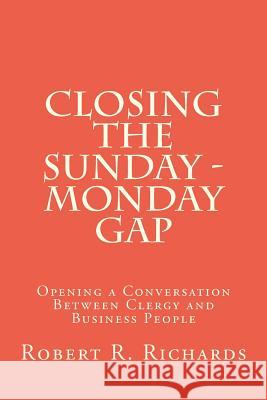Closing the Sunday - Monday Gap: Opening a Conversation Between Clergy and Business People » książka
Closing the Sunday - Monday Gap: Opening a Conversation Between Clergy and Business People
ISBN-13: 9781477698839 / Angielski / Miękka / 2012 / 168 str.
The book explains to clergy, church professionals and business people the relationship between Christianity and capitalism. Where is God in the business world? The problem: while the "faith at work" movement is a burgeoning phenomenon giving rise to a plethora of books for business people seeking to apply their Christian faith at their job, nowhere is there a book serving as a resource to clergy in the specific task of ministering to business people in their congregations. The solution: this book provides the missing link, equipping clergy with a better understanding of the world of business and the capitalistic economic system in the context of Christianity, enabling them to minister more empathetically to people in business. Benefits of the book: After reading Closing the Sunday - Monday Gap, the reader will possess: 1. the analytical tools for rational thinking about economic issues of particular interest to the church: economic justice, globalization, inflation, poverty, environmental protection, housing, money, and philanthropy; 2. a clearer understanding of the role of the business firm in society and how the behavior of the business firm relates to the values, interests and priorities of the church; 3. insights into the perspectives held by business people to assist them in more effectively applying their faith to their daily lives. The overall purpose of this book is to provide clergy and church professionals with the knowledge and analytical tools of economics and business to enable more effective communication with and counseling to people in business. Overview: The book is divided into the following nine topics designed to discuss both (1) the economic system and (2) the functioning of the business firm, presenting both economic concepts and business examples in order to provide the reader with a full understanding of the business world and its relationship to Christianity. 1. The Big Picture: Our Economy: Capitalism and Christianity: Compatible or Conflicting? 2. The Small Picture: The Business Firm: Profits, Ethics, Competition, Community 3. Economic Issues Important to the Church: Poverty, Housing, Environment and Energy 4. Money: Micro-lending: bringing the world's poor into the game 5. Globalization: International Trade: Discord or Harmony? War or Peace? 6. Stewardship of Natural Resources: Environmental Economics: Protecting God's Creations 7. Stewardship of Financial Resources: Generosity, Philanthropy, Love 8. Economic Justice: Egalitarianism, Wealth Disparities 9. Human Effects of Private Enterprise: Materialism or Meaning? Why This Book? The impetus to write this book came largely from the findings of scholars Laura Nash of Harvard and Scotty McLennan of Stanford, published in their book "Church on Sunday, Work on Monday" (San Francisco: Jossey-Bass, 2001) in which they observe "a pervasive feeling of inadequacy on the part of clergy and church leaders to substantively address issues facing business people." They further observe that seminarians report a "disappointing lack of training on contemporary economic institutions." Further, with the accelerating "faith at work" movement, more and more clergy are becoming concerned that this movement is based on a flawed superficial "prosperity" theology. Therefore, there is a desire for the tools to relate sound theology to sound economics. This book connects sound theology to sound economics, providing both church professionals and business people with a clear understanding of the relationship between capitalism and Christianity.
Zawartość książki może nie spełniać oczekiwań – reklamacje nie obejmują treści, która mogła nie być redakcyjnie ani merytorycznie opracowana.











